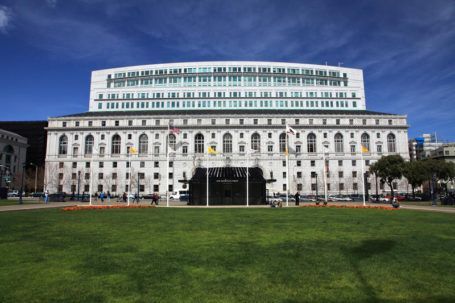State Supreme Court ruling could make local ballot initiatives more difficult
 A recent unanimous ruling by the California Supreme Court (pictured) that may force the city of San Diego to retroactively create pensions for non-police employees hired since the start of 2013 isn’t just bad news for pension reformers. It also serves notice to elected officials who participate in signature-gathering campaigns for local ballot measures that they need to be wary of doing so in a way that interferes with state laws requiring that changes in work conditions be collectively bargained with employee unions.
A recent unanimous ruling by the California Supreme Court (pictured) that may force the city of San Diego to retroactively create pensions for non-police employees hired since the start of 2013 isn’t just bad news for pension reformers. It also serves notice to elected officials who participate in signature-gathering campaigns for local ballot measures that they need to be wary of doing so in a way that interferes with state laws requiring that changes in work conditions be collectively bargained with employee unions.
At issue was Proposition B, approved by San Diego voters in 2012 by a nearly 2-to-1 margin. The measure required that all city employees who began their jobs on or after Jan. 1, 2013 – except for police officers – get 401(k)-style retirement benefits instead of the defined benefit pensions that left San Diego finances in near ruins more than a decade ago because of City Council decisions to underfund them.
But San Diego employee unions and the California Public Employees Relations Board (PERB) argued even before the measure reached the ballot that it violated state collective bargaining laws because the campaign for the pension changes was led in 2011 and 2012 by then-San Diego Mayor Jerry Sanders. He claimed that his role in the Prop. B campaign was as a private citizen – not as mayor – and thus he faced no obligation to collectively bargain with public employee unions before touting the direct-democracy initiative.
Before reaching the state high court, a trial judge first disagreed with Sanders and San Diego, then an appellate court sided with the city. But all seven state justices joined in a ruling that found that city leaders had not met their requirement to first seek changes at the bargaining table before seeking to impose them through direct democracy.
“Allowing public officials to purposefully evade the meet-and-confer requirements of [state collective bargaining rules] by officially sponsoring a citizens’ initiative would seriously undermine the policies served by the statute: fostering full communication between public employers and employees, as well as improving personnel management and employer-employee relations,” the court held. It ordered the case be sent back to the appellate court to determine how San Diego should untangle its mess.
Elected leaders may be less likely to lead ballot fights
The decision seems likely to change the nature of direct democracy going forward – at least at the local level of California government.
Direct democracy, brought forward in California by Gov. Hiram Johnson in 1911, has greatly benefited from the active participation of elected officials. They are often more able to win public approval of sweeping reforms through the ballot box than they can through the Legislature or city or county governing boards, which are often allied with deep-pockets special interests.
For example, Earl Warren – the former U.S. Supreme Court chief justice and California governor – repeatedly led ballot campaigns as Alameda County district attorney that directly affected many areas of California life.
But similar efforts by a politician in 2018 would face a different kind of vetting than Warren faced. Going forward, any ballot proposal that affects public employees in any way is subject to a potential court veto if it can be established that it were led by elected officials who didn’t live up to their collective bargaining obligations.
The California PERB Blog’s analysis noted that justices “did leave open the possibility that government officials can separate their official actions from their private activities. However, the court did not provide any guidance on what a government official would have to do to make such a distinction clear.”
Chris Reed
Chris Reed is a regular contributor to Cal Watchdog. Reed is an editorial writer for U-T San Diego. Before joining the U-T in July 2005, he was the opinion-page columns editor and wrote the featured weekly Unspin column for The Orange County Register. Reed was on the national board of the Association of Opinion Page Editors from 2003-2005. From 2000 to 2005, Reed made more than 100 appearances as a featured news analyst on Los Angeles-area National Public Radio affiliate KPCC-FM. From 1990 to 1998, Reed was an editor, metro columnist and film critic at the Inland Valley Daily Bulletin in Ontario. Reed has a political science degree from the University of Hawaii (Hilo campus), where he edited the student newspaper, the Vulcan News, his senior year. He is on Twitter: @chrisreed99.
Related Articles
Assembly challenger tries to make campaign issue of unreleased tax returns
The Democratic challenger in an Orange County Assembly race is going after the incumbent, Republican Young Kim, for not releasing her
Electric skateboard startups set to flourish in CA
With a unique new law on its side, the nascent electric skateboard industry has made California its home. Two new startups —
In CA, Smarter Balanced testing shapes fate of Common Core
It’s crunch time for California supporters of the new Common Core educational standards. On several fronts, key business, education and political interests have




